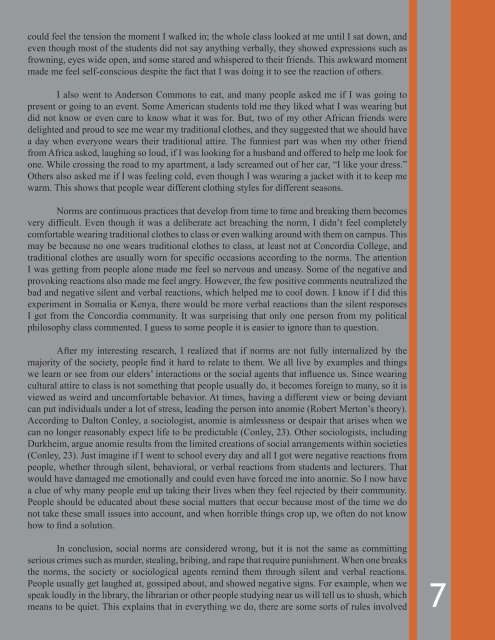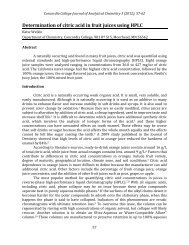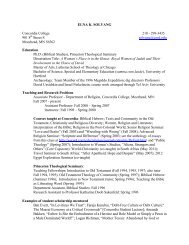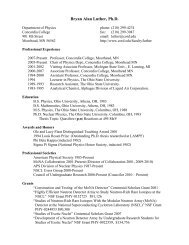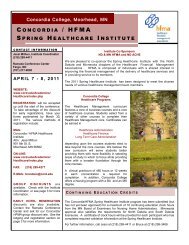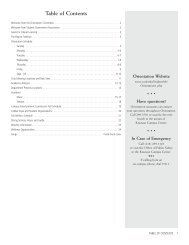Djembe - Concordia College
Djembe - Concordia College
Djembe - Concordia College
Create successful ePaper yourself
Turn your PDF publications into a flip-book with our unique Google optimized e-Paper software.
could feel the tension the moment I walked in; the whole class looked at me until I sat down, and<br />
even though most of the students did not say anything verbally, they showed expressions such as<br />
frowning, eyes wide open, and some stared and whispered to their friends. This awkward moment<br />
made me feel self-conscious despite the fact that I was doing it to see the reaction of others.<br />
I also went to Anderson Commons to eat, and many people asked me if I was going to<br />
present or going to an event. Some American students told me they liked what I was wearing but<br />
did not know or even care to know what it was for. But, two of my other African friends were<br />
delighted and proud to see me wear my traditional clothes, and they suggested that we should have<br />
a day when everyone wears their traditional attire. The funniest part was when my other friend<br />
from Africa asked, laughing so loud, if I was looking for a husband and offered to help me look for<br />
one. While crossing the road to my apartment, a lady screamed out of her car, “I like your dress.”<br />
Others also asked me if I was feeling cold, even though I was wearing a jacket with it to keep me<br />
warm. This shows that people wear different clothing styles for different seasons.<br />
Norms are continuous practices that develop from time to time and breaking them becomes<br />
very difficult. Even though it was a deliberate act breaching the norm, I didn’t feel completely<br />
comfortable wearing traditional clothes to class or even walking around with them on campus. This<br />
may be because no one wears traditional clothes to class, at least not at <strong>Concordia</strong> <strong>College</strong>, and<br />
traditional clothes are usually worn for specific occasions according to the norms. The attention<br />
I was getting from people alone made me feel so nervous and uneasy. Some of the negative and<br />
provoking reactions also made me feel angry. However, the few positive comments neutralized the<br />
bad and negative silent and verbal reactions, which helped me to cool down. I know if I did this<br />
experiment in Somalia or Kenya, there would be more verbal reactions than the silent responses<br />
I got from the <strong>Concordia</strong> community. It was surprising that only one person from my political<br />
philosophy class commented. I guess to some people it is easier to ignore than to question.<br />
After my interesting research, I realized that if norms are not fully internalized by the<br />
majority of the society, people find it hard to relate to them. We all live by examples and things<br />
we learn or see from our elders’ interactions or the social agents that influence us. Since wearing<br />
cultural attire to class is not something that people usually do, it becomes foreign to many, so it is<br />
viewed as weird and uncomfortable behavior. At times, having a different view or being deviant<br />
can put individuals under a lot of stress, leading the person into anomie (Robert Merton’s theory).<br />
According to Dalton Conley, a sociologist, anomie is aimlessness or despair that arises when we<br />
can no longer reasonably expect life to be predictable (Conley, 23). Other sociologists, including<br />
Durkheim, argue anomie results from the limited creations of social arrangements within societies<br />
(Conley, 23). Just imagine if I went to school every day and all I got were negative reactions from<br />
people, whether through silent, behavioral, or verbal reactions from students and lecturers. That<br />
would have damaged me emotionally and could even have forced me into anomie. So I now have<br />
a clue of why many people end up taking their lives when they feel rejected by their community.<br />
People should be educated about these social matters that occur because most of the time we do<br />
not take these small issues into account, and when horrible things crop up, we often do not know<br />
how to find a solution.<br />
In conclusion, social norms are considered wrong, but it is not the same as committing<br />
serious crimes such as murder, stealing, bribing, and rape that require punishment. When one breaks<br />
the norms, the society or sociological agents remind them through silent and verbal reactions.<br />
People usually get laughed at, gossiped about, and showed negative signs. For example, when we<br />
speak loudly in the library, the librarian or other people studying near us will tell us to shush, which<br />
means to be quiet. This explains that in everything we do, there are some sorts of rules involved<br />
7


